时态综合练习——一般现在时、一般将来时、现在进行时知识分享
- 格式:doc
- 大小:20.00 KB
- 文档页数:3
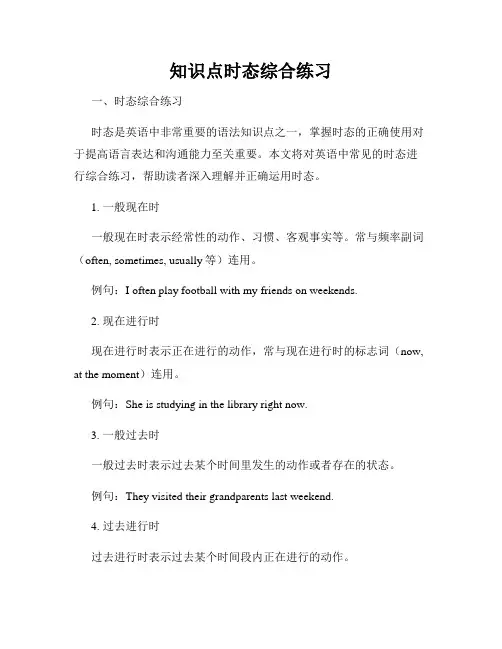
知识点时态综合练习一、时态综合练习时态是英语中非常重要的语法知识点之一,掌握时态的正确使用对于提高语言表达和沟通能力至关重要。
本文将对英语中常见的时态进行综合练习,帮助读者深入理解并正确运用时态。
1. 一般现在时一般现在时表示经常性的动作、习惯、客观事实等。
常与频率副词(often, sometimes, usually等)连用。
例句:I often play football with my friends on weekends.2. 现在进行时现在进行时表示正在进行的动作,常与现在进行时的标志词(now, at the moment)连用。
例句:She is studying in the library right now.3. 一般过去时一般过去时表示过去某个时间里发生的动作或者存在的状态。
例句:They visited their grandparents last weekend.4. 过去进行时过去进行时表示过去某个时间段内正在进行的动作。
例句:He was cooking dinner when the phone rang.5. 一般将来时一般将来时表示将来某个时间将要发生的动作或者存在的状态。
例句:I will call you later today.6. 现在完成时现在完成时表示过去发生的事情对现在造成的影响或者结果。
例句:He has already finished his homework.7. 过去完成时过去完成时表示过去某个时间或动作之前已经发生的动作或状态。
例句:She had already left when I arrived.8. 将来进行时将来进行时表示将来某个时间段内正在进行的动作。
例句:I will be traveling to London next week.9. 现在完成进行时现在完成进行时表示过去某个时间开始并一直持续到现在的动作。
例句:They have been working on this project for two months.10. 过去完成进行时过去完成进行时表示过去某个时间开始并一直持续到过去某个时间的动作。
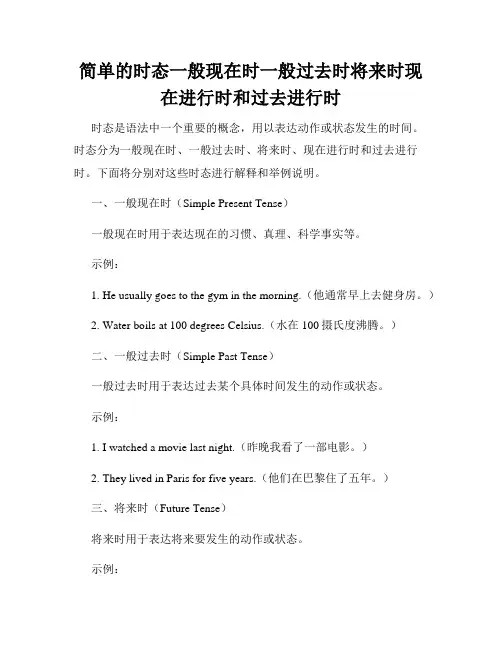
简单的时态一般现在时一般过去时将来时现在进行时和过去进行时时态是语法中一个重要的概念,用以表达动作或状态发生的时间。
时态分为一般现在时、一般过去时、将来时、现在进行时和过去进行时。
下面将分别对这些时态进行解释和举例说明。
一、一般现在时(Simple Present Tense)一般现在时用于表达现在的习惯、真理、科学事实等。
示例:1. He usually goes to the gym in the morning.(他通常早上去健身房。
)2. Water boils at 100 degrees Celsius.(水在100摄氏度沸腾。
)二、一般过去时(Simple Past Tense)一般过去时用于表达过去某个具体时间发生的动作或状态。
示例:1. I watched a movie last night.(昨晚我看了一部电影。
)2. They lived in Paris for five years.(他们在巴黎住了五年。
)三、将来时(Future Tense)将来时用于表达将来要发生的动作或状态。
示例:1. We will have a meeting tomorrow.(我们明天要开会。
)2. She is going to travel to Japan next month.(她下个月将要去日本旅行。
)四、现在进行时(Present Continuous Tense)现在进行时用于表达正在进行的动作。
示例:1. They are watching TV at the moment.(他们此刻正在看电视。
)2. She is studying for her exam right now.(她正在复习考试。
)五、过去进行时(Past Continuous Tense)过去进行时用于表达过去某一时刻正在进行的动作。
示例:1. I was reading a book when she called.(她给我打电话的时候,我正在看书。
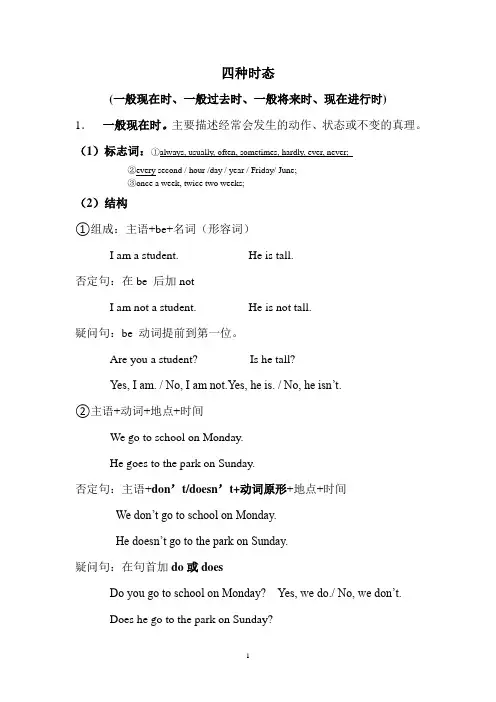
四种时态(一般现在时、一般过去时、一般将来时、现在进行时)1.一般现在时。
主要描述经常会发生的动作、状态或不变的真理。
(1)标志词:①always, usually, often, sometimes, hardly, ever, never;②every second / hour /day / year / Friday/ June;③once a week, twice two weeks;(2)结构①组成:主语+be+名词(形容词)I am a student. He is tall.否定句:在be 后加notI am not a student. He is not tall.疑问句:be 动词提前到第一位。
Are you a student? Is he tall?Yes, I am. / No, I am not.Yes, he is. / No, he isn’t.②主语+动词+地点+时间We go to school on Monday.He goes to the park on Sunday.否定句:主语+don’t/doesn’t+动词原形+地点+时间We don’t go to school on Monday.He doesn’t go to the park on Sunday.疑问句:在句首加do或doesDo you go to school on Monday? Yes, we do./ No, we don’t.Does he go to the park on Sunday?Yes, he does./ No, he doesn’t.(3)动词三单变化:①在原单词末尾加s , 如:like –likes②单词以o, sh, ch, s, x 结尾加es, 如:go –goes③单词末尾为辅音+y结尾去y加ies 如:study- studies2. 现在进行时:主要叙述正在发生的事情。
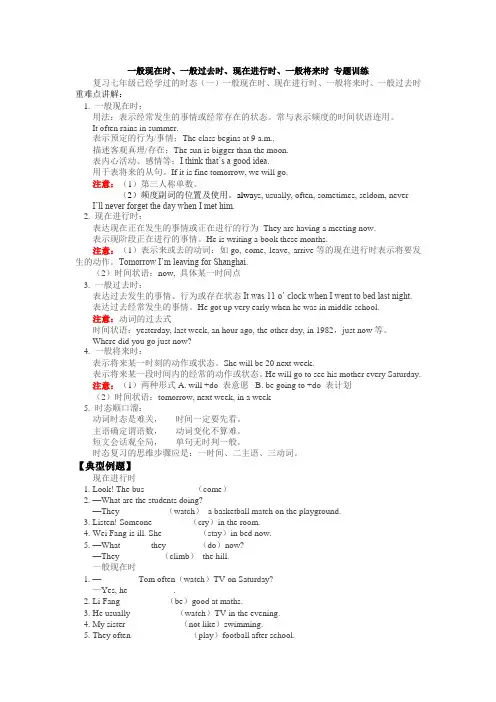
一般现在时、一般过去时、现在进行时、一般将来时专题训练复习七年级已经学过的时态(一)一般现在时、现在进行时、一般将来时、一般过去时重难点讲解:1. 一般现在时:用法:表示经常发生的事情或经常存在的状态。
常与表示频度的时间状语连用。
It often rains in summer.表示预定的行为/事情;The class begins at 9 a.m..描述客观真理/存在;The sun is bigger than the moon.表内心活动、感情等;I think that’s a good idea.用于表将来的从句。
If it is fine tomorrow, we will go.注意:(1)第三人称单数。
(2)频度副词的位置及使用。
alwa ys, usually, often, sometimes, seldom, never I’ll never forget the day when I met him.2. 现在进行时:表达现在正在发生的事情或正在进行的行为They are having a meeting now.表示现阶段正在进行的事情。
He is writing a book these months.注意:(1)表示来或去的动词:如go, come, leave, arrive等的现在进行时表示将要发生的动作。
Tomorrow I’m leaving for Shanghai.(2)时间状语:now, 具体某一时间点3. 一般过去时:表达过去发生的事情、行为或存在状态It was 11 o’ clock when I went to bed last night.表达过去经常发生的事情。
He got up very early when he was in middle school.注意:动词的过去式时间状语:yesterday, last week, an hour ago, the other day, in 1982,just now等。
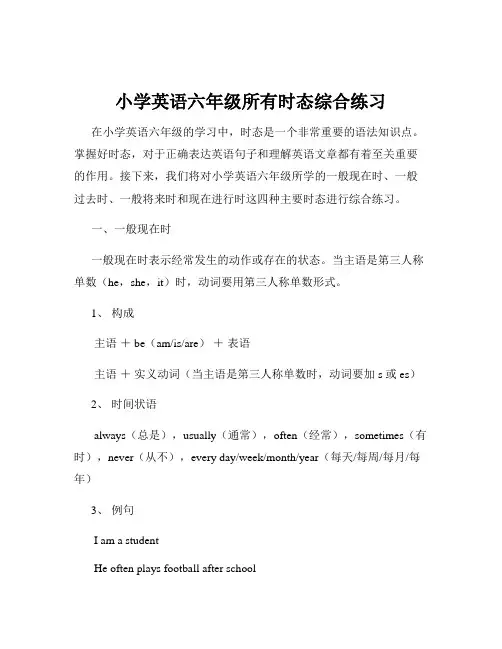
小学英语六年级所有时态综合练习在小学英语六年级的学习中,时态是一个非常重要的语法知识点。
掌握好时态,对于正确表达英语句子和理解英语文章都有着至关重要的作用。
接下来,我们将对小学英语六年级所学的一般现在时、一般过去时、一般将来时和现在进行时这四种主要时态进行综合练习。
一、一般现在时一般现在时表示经常发生的动作或存在的状态。
当主语是第三人称单数(he,she,it)时,动词要用第三人称单数形式。
1、构成主语+ be(am/is/are)+表语主语+实义动词(当主语是第三人称单数时,动词要加 s 或 es)2、时间状语always(总是),usually(通常),often(经常),sometimes(有时),never(从不),every day/week/month/year(每天/每周/每月/每年)3、例句I am a studentHe often plays football after schoolThey are very happy练习:1、 My father ______ (watch) TV every night2、 She ______ (like) music very much3、 The children often ______ (play) in the park二、一般过去时一般过去时表示过去发生的动作或存在的状态。
1、构成主语+ was/were +表语主语+动词的过去式2、时间状语yesterday(昨天),last week/month/year(上周/上个月/去年),ago(以前),in +过去的年份3、例句I was at home yesterdayThey played basketball last weekHe went to Beijing two years ago练习:1、 We ______ (have) a party last night2、 She ______ (buy) a new dress yesterday3、 He ______ (do) his homework an hour ago三、一般将来时一般将来时表示将来要发生的动作或存在的状态。
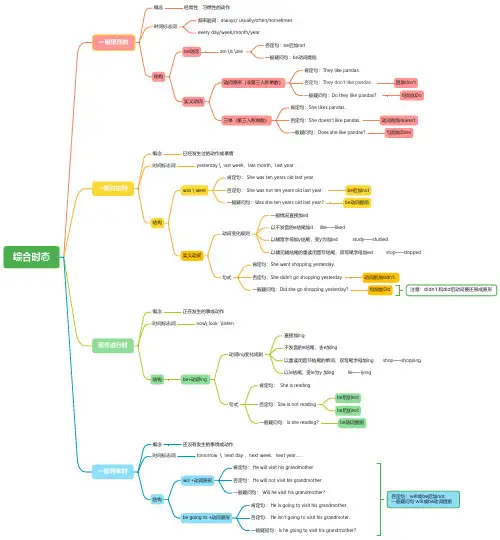
综合时态一般现在时一般过去时现在进行时 概念时间标志词结构经常性、习惯性的动作频率副词:always/ usually/often/sometimese very day/week/month/yearb e 动词实义动词a m \is \are否定句:be 后加not一般疑问句:be 动词提前动词原形(非第三人称单数)三单(第三人称单数)一般疑问句:Do they like pandas?一般疑问句:Does she like pandas?概念时间标志词结构已经发生过的动作或事情y esterday \ last week 、last month 、last year实义动词概念正在发生的事或动作时间标志词n ow\ look \listen结构b e+动词ing一般将来时概念还没有发生的事情或动作时间标志词t omorrow \ next day 、next week 、next year……结构w ill +动词原形b e going to +动词原形 w as \ were一般疑问句:Was she ten years old last year?肯定句: She was ten years old last year.否定句: She was not ten years old last year.b e 后加notb e 动词提前句式肯定句:She went shopping yesterday.否定句:She didn't go shopping yesterday.动词前加didn't,一般疑问句:Did she go shopping yesterday?句前加Did注意:didn't 和did 后动词要还原成原形动词变化规则一般情况直接加ed以不发音的e 结尾加d like——liked以辅音字母加y 结尾,变y 为i 加ed study——studied以辅元辅结尾的重读闭音节结尾,双写尾字母加ed stop——stopped肯定句:They like pandas.否定句:They don't like pandas.借助don't句前加Do肯定句:She likes pandas.否定句:She doesn't like pandas.动词前加doesn't句前加Does动词ing 变化规则句式肯定句: She is reading否定句:She is not readingb e 后加notb e 后加not一般疑问句:Is she reading?b e 动词提前直接加ing不发音的e 结尾,去e 加ing以重读闭音节结尾的单词,双写尾字母加ing shop——shopping以ie 结尾,变ie 为y 加ing lie——lying肯定句: He will visit his grandmother.否定句: He will not visit his grandmother.一般疑问句: Will he visit his grandmother ?肯定句: He is going to visit his grandmother.否定句: He isn't going to visit his grandmoter.一般疑问句:Is he going to visit his grandmother? 否定句:will 或be 后加not一般疑问句 will 或be 动词提前。

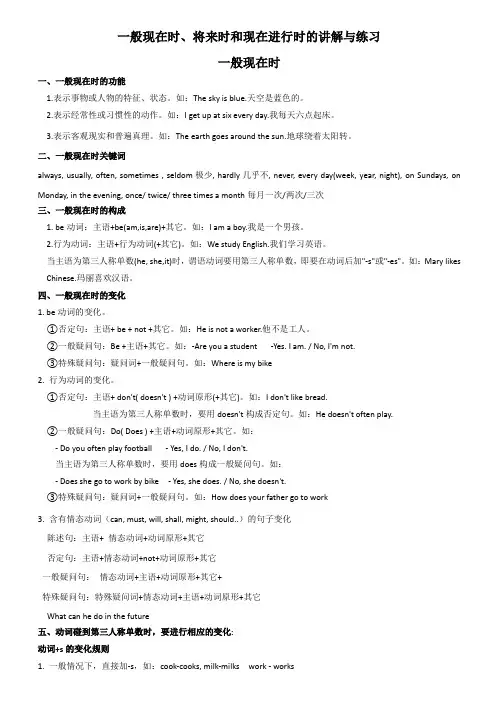
一般现在时、将来时和现在进行时的讲解与练习一般现在时一、一般现在时的功能1.表示事物或人物的特征、状态。
如:The sky is blue.天空是蓝色的。
2.表示经常性或习惯性的动作。
如:I get up at six every day.我每天六点起床。
3.表示客观现实和普遍真理。
如:The earth goes around the sun.地球绕着太阳转。
二、一般现在时关键词always, usually, often, sometimes , seldom极少, hardly几乎不, never, every day(week, year, night), on Sundays, on Monday, in the evening, once/ twice/ three times a month每月一次/两次/三次三、一般现在时的构成1. be动词:主语+be(am,is,are)+其它。
如:I am a boy.我是一个男孩。
2.行为动词:主语+行为动词(+其它)。
如:We study English.我们学习英语。
当主语为第三人称单数(he, she,it)时,谓语动词要用第三人称单数,即要在动词后加"-s"或"-es"。
如:Mary likes Chinese.玛丽喜欢汉语。
四、一般现在时的变化1. be动词的变化。
①否定句:主语+ be + not +其它。
如:He is not a worker.他不是工人。
②一般疑问句:Be +主语+其它。
如:-Are you a student -Yes. I am. / No, I'm not.③特殊疑问句:疑问词+一般疑问句。
如:Where is my bike2. 行为动词的变化。
①否定句:主语+ don't( doesn't ) +动词原形(+其它)。
如:I don't like bread.当主语为第三人称单数时,要用doesn't构成否定句。
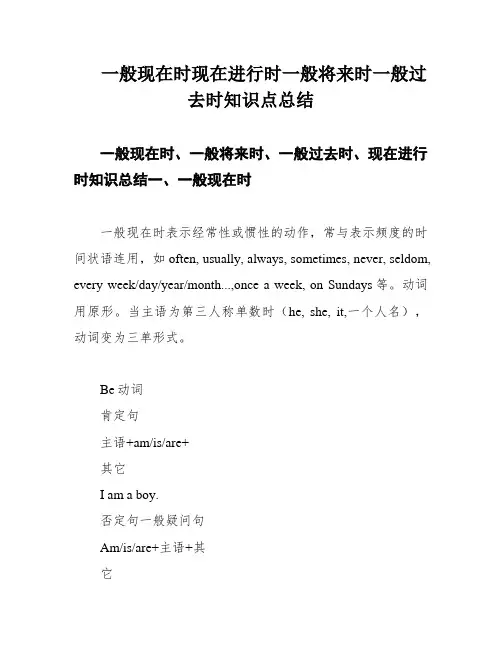
一般现在时现在进行时一般将来时一般过去时知识点总结一般现在时、一般将来时、一般过去时、现在进行时知识总结一、一般现在时一般现在时表示经常性或惯性的动作,常与表示频度的时间状语连用,如often, usually, always, sometimes, never, seldom, every week/day/year/month...,once a week, on Sundays等。
动词用原形。
当主语为第三人称单数时(he, she, it,一个人名),动词变为三单形式。
Be动词肯定句主语+am/is/are+其它I am a boy.否定句一般疑问句Am/is/are+主语+其它Are you a boy? Yes, I am.No, I am not.Do+主语+动词原形+其它?Do you play basketball after school everyday? Yes, we do. / No, we don't.Does+主语+动词原形+其它。
Does he swim well ? Yes, he does. / No, XXX't.非凡疑问句疑问词(where/what/ when/who/why/how)+am/is/are+主语+别的Where are you?疑问词+do+主语+动词真相+别的?What do you do afterschool everyday?主语+am/is/arenot+别的I am not aXXX.第一人主语+动词原形(+主语+don't+行称I、第其它)。
We play动词原形(+其它)。
wedon’t为二人称basketball afteryou、XXX.playbasketball动复数after schoolXXX.词第三人主语+动词三单主语+称单数式(+别的)。
doesn’t+动词真相(+其XXX.它)。
XXX’tswim well.疑问词+does+主语+动词原形+其它。
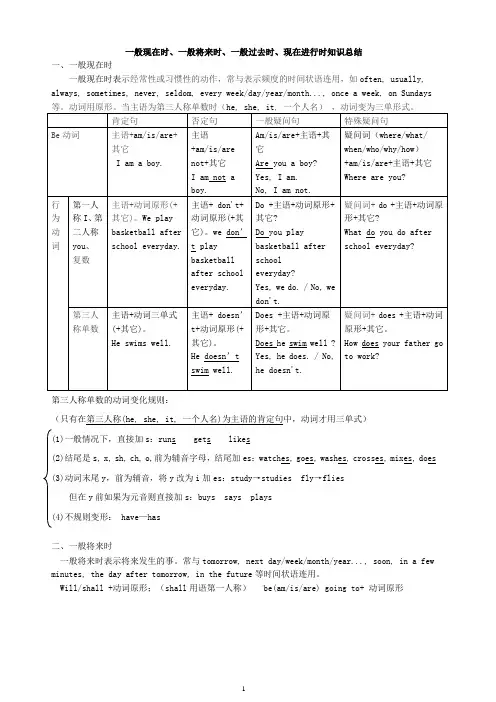
一般现在时、一般将来时、一般过去时、现在进行时知识总结一、一般现在时一般现在时表示经常性或习惯性的动作,常与表示频度的时间状语连用,如often, usually, always, sometimes, never, seldom, every week/day/year/month..., once a week, on Sundays第三人称单数的动词变化规则:(只有在第三人称(he, she, it, 一个人名)为主语的肯定句中,动词才用三单式)(1)一般情况下,直接加s:runs gets likes(2)结尾是s, x, sh, ch, o,前为辅音字母,结尾加es:watches, goes, washes, crosses, mixes, does(3)动词末尾y,前为辅音,将y改为i加es:study→studies fly→flies但在y前如果为元音则直接加s:buys says plays(4)不规则变形: have—has二、一般将来时一般将来时表示将来发生的事。
常与tomorrow, next day/week/month/year..., soon, in a few minutes, the day after tomorrow, in the future等时间状语连用。
Will/shall +动词原形;(shall用语第一人称) be(am/is/are) going to+ 动词原形三、一般过去时一般过去时表示过去某一时候或某一段时间所发生了的事情或存在的状态。
常与过去时间yesterday ,ago, this morning ,just now ,a moment ago ,last night / year / week/month ,once upon a time ,the other day,before ,the day before yesterday, in 1989, at the age of five, one day, then(那时), on that day, in the past 连用。
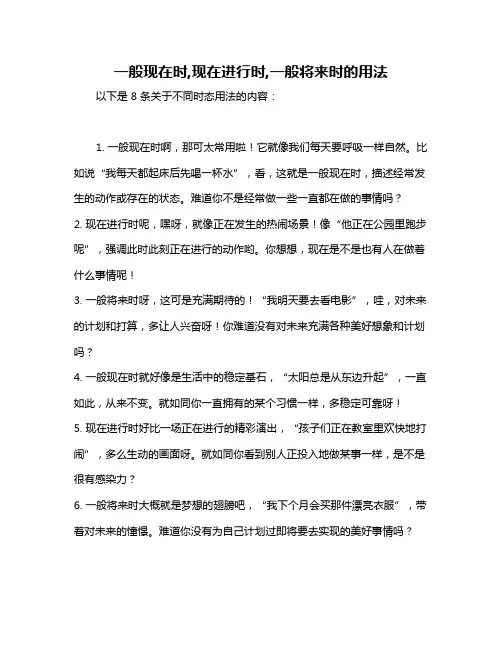
一般现在时,现在进行时,一般将来时的用法以下是 8 条关于不同时态用法的内容:
1. 一般现在时啊,那可太常用啦!它就像我们每天要呼吸一样自然。
比如说“我每天都起床后先喝一杯水”,看,这就是一般现在时,描述经常发生的动作或存在的状态。
难道你不是经常做一些一直都在做的事情吗?
2. 现在进行时呢,嘿呀,就像正在发生的热闹场景!像“他正在公园里跑步呢”,强调此时此刻正在进行的动作哟。
你想想,现在是不是也有人在做着什么事情呢!
3. 一般将来时呀,这可是充满期待的!“我明天要去看电影”,哇,对未来的计划和打算,多让人兴奋呀!你难道没有对未来充满各种美好想象和计划吗?
4. 一般现在时就好像是生活中的稳定基石,“太阳总是从东边升起”,一直如此,从来不变。
就如同你一直拥有的某个习惯一样,多稳定可靠呀!
5. 现在进行时好比一场正在进行的精彩演出,“孩子们正在教室里欢快地打闹”,多么生动的画面呀。
就如同你看到别人正投入地做某事一样,是不是很有感染力?
6. 一般将来时大概就是梦想的翅膀吧,“我下个月会买那件漂亮衣服”,带着对未来的憧憬。
难道你没有为自己计划过即将要去实现的美好事情吗?
7. 一般现在时宛如生活的节拍器,“他总是很乐观”,这就是一贯的状态呀。
就好像身边那个总是乐呵呵的朋友,总是如此呢!
8. 现在进行时如同跳动的火焰,“妈妈正在厨房忙着做饭”,热烈而充满活力。
想想你身边正在忙碌的人,是不是也是这样活力满满呀!
我觉得时态真的是太神奇啦,它们让我们能够准确地表达不同时间的事情和状态呢!。
动词时态一(一般现在时,一般过去时,一般将来时及现在进行时)【用法讲解】考试要求:英语的动词的时态共有十六种,但是中考常考的主要有八种,一般现在时、一般过去时、一般将来时、现在进行时、现在完成时、过去进行时、过去将来时,过去完成时等时态的构成和用法。
本节先讲述一下一般现在时,一般过去时、一般将来时和现在进行时。
1. 一般现在时一般现在时的构成:一般现在时主要用动词原形表示,如果主语是第三人称单数,一般在动词原形后加-s或-es。
例如:I have breakfast at 7 every morning. 我每天早晨7点吃早餐。
He goes swimming on Sundays. 每周日他都去游泳。
一般现在时的用法:(1)表示经常发生的动作或者经常存在的状态。
经常和表示时间的状语often,always,usually,sometimes,every day等连用。
例如:My sister usually goes to school on foot.我姐姐经常步行去上学。
We often come to school at six in the morning.我们经常在早上六点到学校。
(2)表示某种习惯或者能力,也可以表示职业、特征等。
例如:My mother often gets up very early in the morning.我的妈妈经常在早上起床很早。
This kind of car runs very fast.这种小汽车跑得非常快。
(3)表示客观事实、客观规律或者客观真理。
例如:This kind of trees never grows in the desert.这种树从来不在沙漠里生长。
Do you know that knowledge is power?你知道知识就是力量吗?(4)在时间、条件、让步等状语从句中,表示将来的动作。
例如:They’ll be so happy when I tell them.我告诉他们时,他们会很高兴的。
时态综合练习(一般现在时,现在进行时,一般将来时,一般过去时)试题预览时态综合练习(一般现在时,现在进行时,一般将来时,一般过去时)1. Look! Li Lei _____________(do) homework in his bedroom.2. Ann’s grandparents enjoy ____________(read) in the village.3. Please stand up and _______ (read) the book.4. Jim’s grandfather likes __________(walk) after supper.5. -----Where ______(be) Jim?------He _______(be) in his factory. He ________(work) there.6. Do you like _________(have) eggs for breakfast?7. Listen! Mary __________(sing) in her room.8. _______your friend _________(sit) under the big tree now?9. Let’s _________(go) and ________(help) the old man.10. ----Can he _______(fly) a kite?------Yes, he can. He __________(fly) a kite with his friend there.11. I ___________(write) a book at the moment. I __________(finish) it next month.12. My family often _____(go) for a picnic on Sunday, but next Sunday, we ________(stay) at home.13. It _______ (be) ten o’clock now. I ________(go) to bed in ten minutes’ time14. My brother usually_____(get) up late. But tomorrow he _______(get)up early, because his friends ________(come) to see him.15. _______you ______(be) at home tomorrow afternoon.No, I _______ . I ________(go) to town with my friends.16. She __________(come) back at 7 this evening.17. When ______ you _______(buy) this radio?I _______(buy) it the year before last.18 At the moment, he ______(be) in the library, He _______(read ) a magazine there.19 They _______(not be) at school the day before yesterday.20 What ______ he ______(say) to you yesterday?21 ______ you always ______(get)up so late?No, I _______(get) up at five yesterday.22 What _____ we ____________(do) tonight?_______we ________(go) to the cinema?23 Where is Tom? He ______________(look) for his tie upstairs.24 What _______ you ______(do) on Sunday?25 __________(not say) that to your father, or he _________(be)angry.26 They’re going _______(move) to London next year.27 When did he ____________(telephone) me yesterday?28 Is your brother__________(write) a letter?29 Don’t ________(close) the window.30 He can ___________( go) with me.31 I will ___________(leave) here tomorrow.32 She doesn’t __________(like) English at all.33 What will he ________(do) tomorrow morning?34 Mary must __________(write)the letter in English.35 Where ________you _________(buy) the TV set? In Shanghai.36 It always __________(rain) in London.Look, it __________(rain) again.37 When _______he _________(get )up every morning?But he _________(get) up at 8 this morning.38 What ________they ________(talk) about in the classroom?Why is it so noisy? Well, I __________(not know).39 I ________(get) a letter from Tom last month.40 He _________(tell) us an interesting story last night.41 She _________(have) a cold last week.42 I ________(lose ) my way , so I asked a policeman for help.。
知识图谱一般现在时知识精讲一、一般现在时表示通常性、规律性、习惯性、真理性的状态或者动作有时间规律发生的事件的一种时间状态。
二、句子结构主语(第一/二人称/第三人称复数)+do (动词原形)主语(第三人称单数)+does (动词三单形式)主语+am/ is /are用法示例表示经常性或习惯性的动作We get up at six every morning.我们每天早上六点钟起床。
表示现在的状态、能力、性格Mr. Wang writes good English but he doesn’t speak well.王先生的英文写得很好但他说不好。
表示格言或警句Pride goes before a fall.骄者必败。
表示永恒的客观真理The earth moves around the sun.地球绕着太阳转。
四、时间状语1. 表示频率的副词: always, usually, often, sometimes, never, hardly, seldom…2. every/once+名词: every day/ week/ year, once a week/ month …3. 表示时间的短语: twice a day, on weekends, on Mondays…情况变形示例一般情况加-s help-helps play-plays以辅音字母+o结尾加-es go-goes do-does以x, sh, ch, s结尾加-es teach-teaches brush-brushes以辅音字母+y结尾变y为i加es study-studies try-tries特殊情况没有统一的规则have-has; be-isbe动词行为动词用法我是am你是are;is跟着他/她/它;复数都用are。
主语是第三人称单数外,都用动词原形;主语是第三人称单数时,动词词尾加-s或-es。
肯定式I am a student.我是一名学生。
时态与语态综合练习时态和语态是英语语法中非常重要的两个方面,对于学好英语,掌握这两个部分是非常必要的。
在本文中,我们将进行时态和语态的综合练习,帮助读者更好地理解和运用这两个知识点。
一、时态练习时态是指动词表达的动作或状态发生的时间。
根据不同的时间点,英语中涉及的时态有以下几种:一般现在时、一般过去时、一般将来时、现在进行时、过去进行时、将来进行时、现在完成时、过去完成时、将来完成时等。
下面是一些练习题,帮助大家加深对时态的理解:1. 他通常去图书馆学习。
2. 昨天我在家里看电视。
3. 明天我将去参观博物馆。
4. 现在,他们正在开会。
5. 上周六我们正在海滩度假。
6. 我们今年夏天将去日本旅行。
7. 我们已经看过这部电影了。
8. 昨晚他刚刚完成了作业。
9. 下周我们将完成这个项目。
10. 我从小学就开始学英语了。
二、语态练习语态是指动词所表示的动作发生时主语的角色关系。
英语中常见的语态有主动语态和被动语态。
下面是一些练习题,帮助大家加深对语态的理解:1. 他们修建了一座新桥。
2. 这封信是昨天写的。
3. 我的手机被我弟弟弄丢了。
4. 这首歌已经被无数人传唱了。
5. 你应该多关心一下你的家人。
6. 报纸上报道了这起交通事故。
7. 我们正在购物中心建设中。
8. 这个问题已经被许多人讨论过了。
9. 他在树上钉了一只鸟笼。
10. 这部小说被翻译成了多种语言。
三、综合练习接下来是一些综合练习题,结合时态和语态的知识,帮助大家更好地掌握和运用这两个方面的内容:1. 昨天妈妈正在做晚饭的时候,突然停电了。
2. 请告诉我你最近在做什么。
3. 我弟弟正在被他的朋友们追赶。
4. 昨晚我在看电影的时候,电话突然响了。
5. 下个月我们将开始新的工作项目。
6. 这篇文章已经通过了编辑的审核。
7. 你应该好好利用你的时间。
8. 这件事将会被人们长时间记住。
9. 整个城市正在为新年庆祝做准备。
10. 这个问题已经被多次提到过了。
标志性词语:1.一般现在时态:often(经常), usually(通常), always(经常), seldom(很少)every day/week/month/year每天/周/月/年, sometimes(有时), never(从不) once a week(一周一次), twice a week(一周两次), on Sundays(星期天)等。
2.一般过去时态:Yesterday(昨天), the day before yesterday(前天)last week(上个星期) last month (上个月)last year(去年)two months ago(两个月之前),in 1990, in those days(那些日子) , long long ago=once upon a time(很久以前)just now(刚才) at the age of 53.现在进行时态:Now(现在), at the moment(此刻). It’s four o’clock(四点钟). Nowadays (如)Look!. Listen!when(当) while(当)等引导的时间状语从句。
4.过去进行时态:at that time(那时) yesterday(昨天), at that moment(那时) at eight o’clock last night(昨晚八点), from8 to 10 yesterday morning (昨天早上的八点到十点), when(当), while(当)等引导的时间状语从句等。
(1) tomorrow(明天), the day after tomorrow(后天), tomorrow morning(明早)(2) next time(下次), next Friday(下周五),next term(下学期), next month (下个月)(3) soon = right away = at once (4) in the future (将来)1. Look! Someone ______ in the next room .A. dancedB. dancingC. is dancingD. has danced2.Our teacher told us the sun ______ bigger than the earth.A. isB. wasC. areD. will be3. I’m afraid you can’t sit here. ------Sorry, I ______ notice.A. don’tB. won’tC. can’tD. didn’t4. When she ______ the magazine(杂志), her dad ______ asleep.A. read, was fallingB. was reading, fellC. was reading, was fallingD. read, fell5. Jim is not coming tonight.------But he______ !A. promises(许诺)B. promisedC. will promiseD. was promising6.Mary often ______ her dresses on weekends.A. washingB. washesC. has washedD. wash7. I’m Chinese. Where ______ from?A. do you comeB. you are comingC. you comeD. are you coming8. Tom and his brother ______to school.A. never walkB. are never walkingC. walk neverD. never are walking9 .It______ hard when I left my house .A. is rainingB. rainsC. was rainingD. will rain10.I think this question ______to answer.A. easyB. is easyC. was easyD. will easy11. Don’t talk so loudly . Your father ______.A. sleepsB. is sleepingC. sleptD. had slept12. Maths______always interested(使……感兴趣)him.A. hasB. haveC. areD. isst week John ______his leg.A. felt and brokenB. fell and brokeC. feels and breaksD. fallen and broken14. Jack ______his thick coat because it was snowing.A. puts onB. put onC. takes onD. took on15. He ______the picture on the wall.A. hangedB. hungC. has hangedD. was hanged16. Next month ______twenty five.A. has my sisterB. my sister will beC. my sister shall haveD. my sister is going to be17. You ______her again in a few weeks.A. will seeB. is going to seeC. sawD. will be going to see18. When______, I’ll talk to him.A. does Peter comeB. Peter will comeC. Peter comesD. can Peter come19.My sister ______to see me. She’ll be here soon.A. comesB. is comingC. had comeD. came20.—What do you do?—I’m an engineer. I __ in a company in Wuhan. I like my job very much.A. workB. had workedC. will workD. worked21.—Is your father a doctor? —Yes, he is. He__________ in Town Hospital.A. has workedB. had workedC. worksD. worked22. Every year many foreigners _________to China to learn Chinese.A. have comeB. comesC. cameD. come23.——Where’s Susan, Mike?——She ___ in the kitchen.A. cooksB. cookedC. is cookingD. has cooked24.——Did you get a job offer? ——Not yet. I ___________.A. waitedB. am waitingC. waitD. was waiting25.——Do you think John will help me move the piano?——You’d better not ask him. He ______ a composition.A. writeB. writesC. is writingD. wrote26.——Where’s the children, Mr. Black?—Oh, they ____ their PE lesson on the playground.A. haveB. hadC. are havingD. have had27.——What’s your brother doing in hi s room now? ——He ______ a kite.A. makesB. madeC. is makingD. will make28. ---Where is Frank now? ---He _______ his bike in the yard.A. fixes upB. fixing upC. is fixing upD. fixed29.——Mary, could you help me?——Wait a moment. I _________.A. read a bookB. did my homeworkC. was watching TVD. am cooking dinner30.——Listen,who _________ in the room?——Let’s go and see.A. is cryingB. cryingC. cryD. cries31. We were in Qingdao last week and __________ great fun there.A. will haveB. have hadC. hadD. have32. Yesterday,Tony’s family _________ a good time.A. hasB. haveC. had33.—Mr Green, _____you___ Three Lanes and Alleys(三坊七巷)last Sunday?—No, but I’ll visit them next week.A. will; go toB. have; been toC. did; go toD. have; gone to34.——What did the teacher say just now?——He _____us not to play computer games all day.A. tellsB. toldC. has toldD. is told35.—Where will they go next Sunday?—They ________ to the Great Wall.A. will goB. goC. has goneD. went36. If it_____________ tomorrow, we_______ travel outside.A. will rain; willB. rains; won’tC. will rain; won’t20.——Jane, can you help me to wash the clothes?——Sorry, Mom. I____________ to the shop.A. goB. wentC. am goingD. have been37. He went into his study (书房), _______ the light and began to work.A. has turned onB. will turn onC. turns onD. turned on。
时态综合练习——一般现在时、一般将来时、现在进行时
时态练习
1.I (go) to school by bus everyday.
2.He (go) for a walk on Sundays.
3.Su Yang (go) to a farm with her parents last weekend.
4.Let’s (go) and (see).
5.What are you (go) to do tomorrow? I’m (go) to (have) a picnic.
6.You (have) a stove and she (have) a tin-opener.
7.What time do you (have) breakfast? I (have) breakfast at a quarter past
seven.
8.What do you (have)? They (have) a blanket.
9.What are you d oing? I’m (have) an English lesson.
10.I (have) a good time yesterday.
11.What are you goi ng to do tomorrow? I’m going to (have) a picnic.
12.What do you (like)? I (like) (duck).
13.What does she (like)? She (like) (take) photos.
14.Does he like (plant) flowers?
15.I (watch) TV at home last Sunday.
16.My father (read) a newspaper now.
17.It (be) the National Day holiday last week.
18.I usually (do) my homework at seven o’clock.
19.There ________ (be)many m onkey s in the mountain.
20.There_________(be)a beautiful garden in our school.
21.There _________(be)some water in the glass.
22.There __________(be)some bread on the table.
23. _______(be)Tom ___________(read) a book now?
24.Where ________(be) your friends yesterday?
25.When _________ (do)your father usually _________ (go) to work?
26.How old __________ (be) you last year?
27.Which dog ________ (be)yours?
28.Ten and two ________ (be) twelve.
29.Look!Many people _________ (swim) in the river.
30. ___ (be) Tom _____________________(go) to Guangzhou tomorrow?
31. ________(do) Ben and Kate _________ (go)go school on foot?
32. What ________(do) Mr Li_____________(do)?
33. Zhangpeng _____________ (buy)a car two days ago.
34. Sometimes Chenjie _______________ (fly)to the USA.
35. On the holiday,I ________________________________ (sing and dance).
36.___________ (do)you go home everyday?No,but my sister________________.
(do)
37. __________ (do) your sister ______________(go) to Shanghai last month?
38.Yesterday,it_____________ (be)rainy.
39.Where _________ (do)you ____________ (go)last night?
40. Listen,the car _________________________ (come)
41.Next week,I ______________________________(visit)my grandparents.
42.Miss Ma ____________(come) from England.
43. Where _______(do)the rain __________(come) from?
44. It _________( come) from the clouds.
45.My hobby _____(be)______________(play) football.
46.My cousin________________(like run)everyday.
47. I _____________(help) Tom ______________ (clean) the room last night.
48. Thank you for____________(tell)me about your day!
49. ________________________ (watch TV) is my hobby.
50.She ____________(buy) some new clothes with her friends this afternoon.
51.Sally often ________(borrow) money from others.
52. Some boys ____________(play) football on the playground now。
53.____your father usually _________(wash) his car in the afternoon?
54.______they _______(read) English books at present ? No, they _________.
55._____you _______(go) to the park with us next Sunday ? No,__________.。